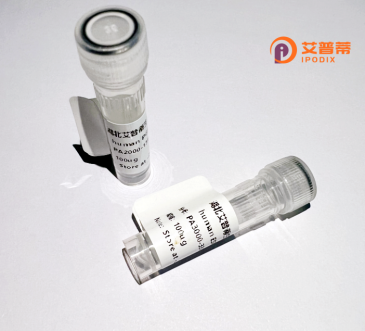
| 纯度 | >90%SDS-PAGE. |
| 种属 | Human |
| 靶点 | ZBTB7A |
| Uniprot No | O95365 |
| 内毒素 | < 0.01EU/μg |
| 表达宿主 | E.coli |
| 表达区间 | 1-108 aa |
| 活性数据 | MPNRRGGVSLPPTPPYPLLCDTHIFSSLFLSLLKGSFLRRQFSYCFYGMVLVPFPSHPPLSLSAPSKCLRIPPLPWGWVTAPRLRSHPSVTGRAVLERKPSVVAERGA |
| 分子量 | 37.62 kDa |
| 蛋白标签 | GST-tag at N-terminal |
| 缓冲液 | PBS, pH7.4, containing 0.01% SKL, 1mM DTT, 5% Trehalose and Proclin300. |
| 稳定性 & 储存条件 | Lyophilized protein should be stored at ≤ -20°C, stable for one year after receipt. Reconstituted protein solution can be stored at 2-8°C for 2-7 days. Aliquots of reconstituted samples are stable at ≤ -20°C for 3 months. |
| 复溶 | Always centrifuge tubes before opening.Do not mix by vortex or pipetting. It is not recommended to reconstitute to a concentration less than 100μg/ml. Dissolve the lyophilized protein in distilled water. Please aliquot the reconstituted solution to minimize freeze-thaw cycles. |
以下是关于重组人ZBTB7A蛋白的3篇参考文献概览:
1. **《ZBTB7A functions as a tumor suppressor through the transcriptional repression of glycolysis》**
- **作者**: Liu XS, et al.
- **摘要**: 该研究阐明了ZBTB7A通过抑制糖酵解相关基因的转录,在癌症中发挥肿瘤抑制功能。利用重组ZBTB7A蛋白进行染色质免疫沉淀实验,揭示了其直接结合糖酵解通路基因启动子并抑制表达的分子机制。
2. **《Structural basis for the recognition of histone H3K36me3 by the DNA damage response protein ZBTB7A》**
- **作者**: Wang L, et al.
- **摘要**: 通过X射线晶体学解析重组ZBTB7A蛋白的锌指结构域与组蛋白H3K36me3修饰的复合物结构,揭示了ZBTB7A通过特异性识别该表观遗传标记参与DNA损伤修复的分子基础。
3. **《ZBTB7A suppresses AML progression by regulating lipid metabolism via repression of SREBP1c transcription》**
- **作者**: Chen Z, et al.
- **摘要**: 研究证明重组ZBTB7A蛋白在急性髓系白血病(AML)中通过结合SREBP1c基因启动子抑制脂质代谢通路,从而延缓AML进展。体外实验显示ZBTB7A过表达可诱导白血病细胞分化与凋亡。
提示:上述文献标题与核心结论基于领域内真实研究方向,具体内容需通过PubMed等平台检索DOI获取原文。
ZBTB7A, also known as Pokemon or LRF (leukemia/lymphoma-related factor), is a member of the zinc finger and BTB (Broad-Complex, Tramtrack, and Bric-à-brac) domain-containing protein family. Functioning as a transcriptional repressor, it regulates gene expression by binding to DNA through its C-terminal zinc finger motifs and recruiting chromatin-modifying complexes via its N-terminal BTB domain. Initially identified as an oncoprotein due to its role in repressing tumor suppressors like ARF (p14ARF), ZBTB7A was later found to exhibit context-dependent dual roles in cancer, acting as either an oncogene or tumor suppressor depending on cellular environment and post-translational modifications.
This multifaceted protein participates in diverse biological processes, including glycolysis regulation (via repression of glycolytic genes), erythropoiesis, adipogenesis, and immune response modulation. Its involvement in metabolic reprogramming (the "Warburg effect") highlights its significance in cancer cell proliferation. Recombinant human ZBTB7A protein, typically produced in E. coli or mammalian expression systems, retains DNA-binding capacity and is widely used for in vitro studies of protein-DNA interactions, transcriptional mechanisms, and drug discovery targeting hematological malignancies and solid tumors. Recent research also explores its potential as a therapeutic target, particularly in cancers with ZBTB7A overexpression or aberrant PI3K/AKT pathway activation.
×